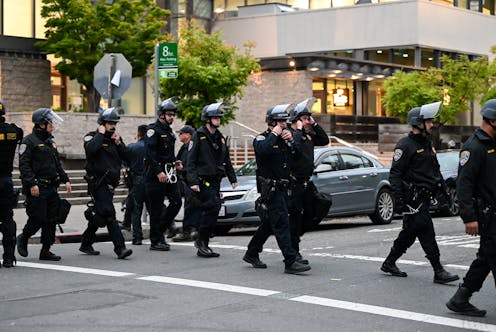For Black Americans, higher police pay doesn’t always mean fewer violent confrontations as it does for other racial groups
- Written by Thaddeus L. Johnson, Assistant Professor of Criminal Justice and Criminology, Georgia State University
 California police officers on their way to patrol a pro-Palestinian demonstration.Tayfun Coskun/Anadolu/Getty Images
California police officers on their way to patrol a pro-Palestinian demonstration.Tayfun Coskun/Anadolu/Getty ImagesPolice unions have come under fire following recent police killings of Black Americans. For the most part, the unions work to improve pay and job conditions for police. But some critics say these police union contracts cost cities...

